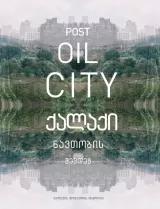Post Oil City: The History of the City's Future
Introduction
“When masses of people reside together, it is called a city, as one man cannot make do on his own; rather we must help each other in life and share in its spoils”
Sulkhan-Saba Orbeliani
A city is the heart of the democratic processes. Growth of the cities and global urbanization is one of the most significant challenges causing number of social, economic and cultural changes. Therefore, the issues: how shall the contemporary city look like, what changes it shall go through, how shall be the ways of solving the existing problems selected , the ways which eventually is reflected on the appearance of the city, are widely debated worldwide.
How will be the cities changed when the traditional energy is fully changed with renewable sources? How will the alternative energy affect the transport policy? How will the cities be transformed as a result of globalization? One may argue that discussing these and other issues offered by the catalogue Post Oil City, at the one glance may be too early for Georgia that faces number of acute and urgent political and social problems. However we hope that bringing the exhibition, originally organized by IFA and Arch+ (in 2010), in Tbilisi and the Georgian, edited translation of the catalogue of the same exhibition -Arch+ 196/197 Post oil City. Future of the City- will give us opportunity to offer the issues actively discussed worldwide to the Georgian society as well.
Future of the City – is the sub-heading of the presented catalogue, which convincingly argues that the vision of the future shall be based on the understanding of the past. The projects in the catalogues and analysis make it obvious, that current architectural and urban processes started in modern architectural period of 20th century. The main difference is that modern architects have to consider the challenges associated with the climate change, extinction of fossil fuels and ecological situation. However, the author of one of the essays, urbanist and architect Hilbert Thilo gives hope with this regard: A discussion of the utopias from the 1960s that deal with the global development of urban civilization can help us better understand the future. For none of the problems affecting the future- climate change, demographic shifts, globalization, and uncontrolled urban growth- can be solved without considering architecture`s impact and sustainability.
The South Caucasus Office of the Heinrich Boell Foundation has been working on urban development issues for years. Together with our partners and in participation of politicians and activists we have organized number of public debates on cities and its development. One shall highlight our scholarship program, which gave opportunity to young scholars to work on individual interdisciplinary projects in the field of sustainable urban development. We think that our attempt, on the one hand to make emphasis on urban problems and on the other hand to contribute in development and extension of existing expertise in this field, has played significant role in increasing the sensitivity of the society towards those issues.
We believe that through analyzing the problems, discussions, policy dialogues, professional concepts, better knowledge and individual responsibility we will get the better urban space-cities, architects of which will be the citizens of Georgia as well!
Nino Lejava
Director
South Caucasus Office of the Heinrich Boell Foundation
